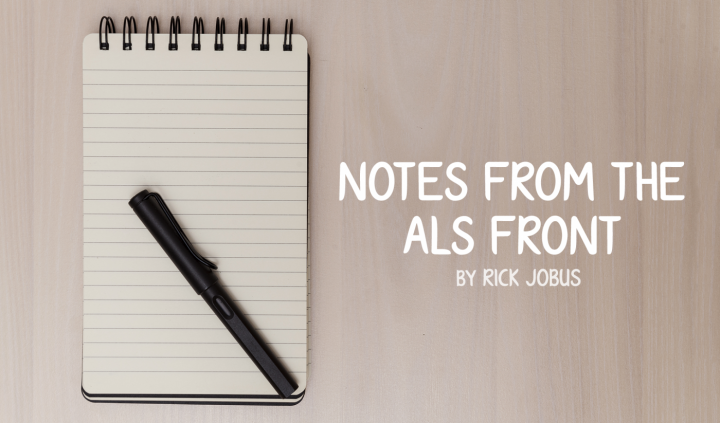Taking Baby Steps in Search of a Cure

“Baby steps.”
That was the advice imparted to Bob Wiley by his psychiatrist, Dr. Leo Marvin, in the movie “What About Bob?“ Wiley, portrayed by Bill Murray, has a perfect storm of maladies including perhaps bacillophobia, somatization disorder, factitious disorder, and pathophobia.
In the face of this onslaught, Marvin, portrayed by Richard Dreyfuss, believes that a series of imperceptibly minuscule positive strides taken by Wiley will provide relief. Bob is encouraged to stop obsessing about the huge issues that paralyze him with fear, and to start tackling the smaller things right in front of him that he can handle by taking one baby step at a time.
By any measure, nothing short of a cure for ALS will amount to more than baby steps, relatively speaking. That said, as we await the laboratory breakthrough that will erase the huge issue that every incurable, fatal disease sufferer obsesses over, there are systemic “baby steps” to be taken. The good news, at present, is that there are some obvious ones that require nothing more than a collective, figurative voice.
As reported in ALS News Today, two pieces of legislation are making their way through the congressional approval process in the U.S. Both seek to accelerate patient access to therapies once that eureka gold strike moment of research and development occurs.
One is the Conditional Approval Act (S 3133), which would enable the granting of provisional and time-limited approval of a drug if it is deemed that:
- the drug sponsor will provide comprehensive clinical data after conditional approval;
- the drug is intended for the treatment of a life-threatening disease;
- the expected benefits of the drug outweigh the potential risks to patients;
- there are no existing meaningful treatments for the disease;
- confirmatory clinical trials are difficult or costly to conduct;
- a certain degree of safety and efficacy of the drug has been demonstrated;
- the necessary post-market surveillance tools are in place.
The period of conditional approval is effective for one year and is renewable for up to four additional one-year terms.
In classic “win-win” manner, if the proposed pathway is followed, ALS stricken folks will avail themselves of promising treatments far sooner, and drug innovators will improve their bottom line. Not only would they generate revenue earlier, but their market entry costs drop.
“Real world evidence” may be used to supplement an application for full approval. With respect to any claim alleging that a drug made available under this program is unsafe or ineffective, no liability shall lie against a sponsor or manufacturer.
The second proposed bill, the Accelerating Access to Critical Therapies for ALS Act (HR 7071), is geared toward making it possible for some ALS patients to begin receiving treatment in parallel with confirmatory clinical trials, and in advance of new drug approval.
It would allow for grants to be awarded to small businesses (as defined in the Small Business Act) “for the provision of investigational drugs through an expanded access program for individuals for the prevention, diagnosis, mitigation, treatment, or cure of amyotrophic lateral sclerosis or another rapidly progressing neurodegenerative disease.”
The amount of funding is not trivial: $75 million for each of fiscal years 2021 and 2022, and $150 million for each of fiscal years 2023 and 2024.
Both bills have their detractors. In the case of S 3133, criticisms may be found in commentary from the National Organization for Rare Diseases and the Muscular Dystrophy Association. Among other issues, each advocacy group argues for a narrower scope and a mechanism for immediate revocation of the conditional approval if deemed necessary.
For HR 7071, the ALS Association’s official statement offers suggested areas for improvement, including a warning against bureaucracy creep. That may be turf protection. The bill would establish a Center of Excellence for Neurodegenerative Diseases, which may solicit and accept gifts, grants, and other donations, establish accounts, and invest and expend funds in support of its mission. This sounds like the ALS Association.
ALS patient-centric groups like Address ALS and I Am ALS are strong endorsers of passing these acts, as am I. Toward that end, I am writing the bills’ sponsors to communicate my enthusiastic support, including for S 3133, Sen. Mike Braun of Indiana, and for HR 7071, Reps. Jeff Fortenberry of Nebraska and Mike Quigley of Illinois. The group I Am ALS provides an online template to do just that.
Additionally, I will request that my state representatives join the bipartisan ALS caucus.
In my opinion, a flawed implementation of a noble intent, particularly as lives hang in the balance, is far superior to inaction. Even a mere debate on how to address this topic explicitly validates the gaping humanitarian need. It is a baby step in the right direction.
Or, to invoke astronaut Neil Armstrong, we have the opportunity to take one small step for a man that can facilitate one giant leap for the ALS struggling portion of mankind.
***
Note: ALS News Today is strictly a news and information website about the disease. It does not provide medical advice, diagnosis, or treatment. This content is not intended to be a substitute for professional medical advice, diagnosis, or treatment. Always seek the advice of your physician or other qualified health provider with any questions you may have regarding a medical condition. Never disregard professional medical advice or delay in seeking it because of something you have read on this website. The opinions expressed in this column are not those of ALS News Today or its parent company, Bionews Services, and are intended to spark discussion about issues pertaining to ALS.







Diana Belland
Thank you for another well researched and highly informative column, Rick.